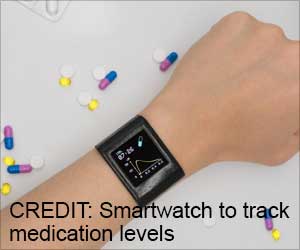Smartwatch-based algorithm developed to detect early signs of viral infections, including COVID-19. The physIQ's app aids in assessing the efficacy of a new therapy, safety monitoring during treatment or general wellness.
- Viral infections can be detected early by the new wearable smartwatch
- physIQ app is embedded in the smartwatch that helps collect physiological data of patients monitored remotely
- The app helps derive heart rate, respiration rate and heart rate variability
The research was led by Craig Goergen, Purdue's Leslie A. Geddes Associate Professor of Biomedical Engineering.
"Smartwatches are well-suited for the detection of early viral infection, including COVID-19," Goergen said.
“Infections can happen at any time, making the continuously tracked data available through an individual's smartwatches uniquely suited to identify the earliest signs of illness. In particular, knowledge of a person's usual heart rate and respiratory during sleep and activity over long periods of time is especially valuable for detecting subtle changes from normal.”
Study monitors participants using physIQ app compared with ‘gold standard’ biosensor data
Along with the smartwatch, they also wore FDA-cleared adhesive chest-based biosensors to capture a single-lead electrocardiogram signal and multiple other parameters for five days of continuous monitoring.
Data from the chest patches were processed by physIQ's U.S. Food and Drug Administration-cleared AI-based algorithms in deriving heart rate, respiration rate and heart rate variability. These data served as "gold standard" references to compare with data from the smartwatches.
"The algorithms for enabling early detection are built off physiological features derived from the biosensor data collected by the smartwatches," said Stephan Wegerich, physIQ's chief science officer.
"Generating accurate and robust physiological features forms the input to subsequent viral detection algorithms. This requires the development of sophisticated signal processing and machine learning algorithms. Combined, these make the most out of smartwatch biosensor data, which is a big part of our collaboration with Purdue."
The viral infection detection algorithm complements physIQ's other health care applications. The goal across all of physIQ's applications is the ability to characterize dynamic human physiology over time, whether it is for assessing the efficacy of a new therapy, safety monitoring during treatment or general wellness.
"The collaborative nature of our relationship and work with Purdue University has the potential to greatly expand physIQ's physiological monitoring applications that can be targeted to a wide range of clinical needs using the pinpointIQ™ and accelerateIQ™ platforms," said Dr. Steve Steinhubl, physIQ's chief medical officer and Purdue alumnus.
In January 2020, physIQ received $500,000 from Purdue Research Foundation's Foundry Investment Fund to help advance its technology. In addition to this investment, three of physIQ's leaders are Purdue alumni, including co-founder and CEO Gary Conkright, Steinhubl and Chad Conkright, vice president of engineering.
Source-Eurekalert











